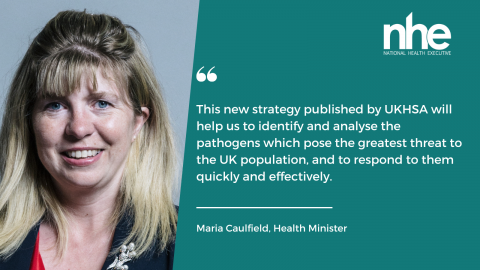The UK Health Security Agency (UKHSA) has launched a new five-year pathogen genomics strategy, setting out how the organisation will tackle threats to public health from infectious diseases.
The strategy’s goal is to improve the UKHSA’s ability to detect and understand pathogens that pose the greatest risks to people in the UK, ultimately informing policy decisions with the best possible scientific evidence.
The UKHSA says that sequenced genomes combined with other health data and research can be a powerful tool for understanding how and why a pathogen is behaving among a human population.
By harnessing existing capacity and expertise within pathogen genomics, the strategy has seven core aims:
- Optimise clinical and public health decision-making in both local and global settings
- Improve diagnostics, vaccines and therapeutics
- Provide a national, scaled-up pathogen genomics service
- Support a workforce transformation within the UKHSA and beyond
- Commit to data sharing and global collaboration
- Drive innovation
- Build high-impact services that are good value for money
This will help efforts in antimicrobial resistance, emerging infections and biosecurity, as well as vaccine preventable diseases and elimination programmes.

The government says the strategy recognises how crucial an element pathogen genomics plays in modern infectious disease control.
The country’s Covid-19 response demonstrated how genomics can be integrated into public health systems to inform local, national and even global decisions.
More than three million SARS-CoV-2 sequences were submitted to the GISAID database by the UK – more than any other nation besides the USA and a quarter of the global total.
Genomics has also shown value when identifying foodborne outbreaks, assessing the risk of mpox and influenza, as well as informing treatment choices for diseases like tuberculosis.
Chief executive at the UKHSA, Professor Dame Jenny Harries, said: “UK experts in the field of pathogen genomics made a vital contribution to the Covid-19 pandemic response and pathogen genomics remains central to the national and international effort to keep the public safe from many other types of infectious disease threats, from tuberculosis to mpox and avian influenza.
“We know it will become even more important in the years to come, and our new strategy will ensure that UKHSA continues to be at the forefront of implementing this technology to keep our communities safe, save lives and protect livelihoods.”
Deputy director for emerging infections and clinical lead for the genomics programme at the UKHSA, Dr Meera Chand, added: “The new UKHSA Pathogen Genomics Strategy will provide a framework for us to build on our already substantial capacity in this area, and to implement genomics across all our work to keep the public safe from threats to their health.”
Image credit: iStock



















